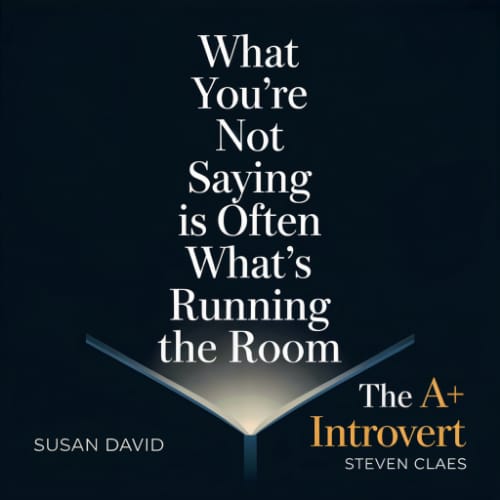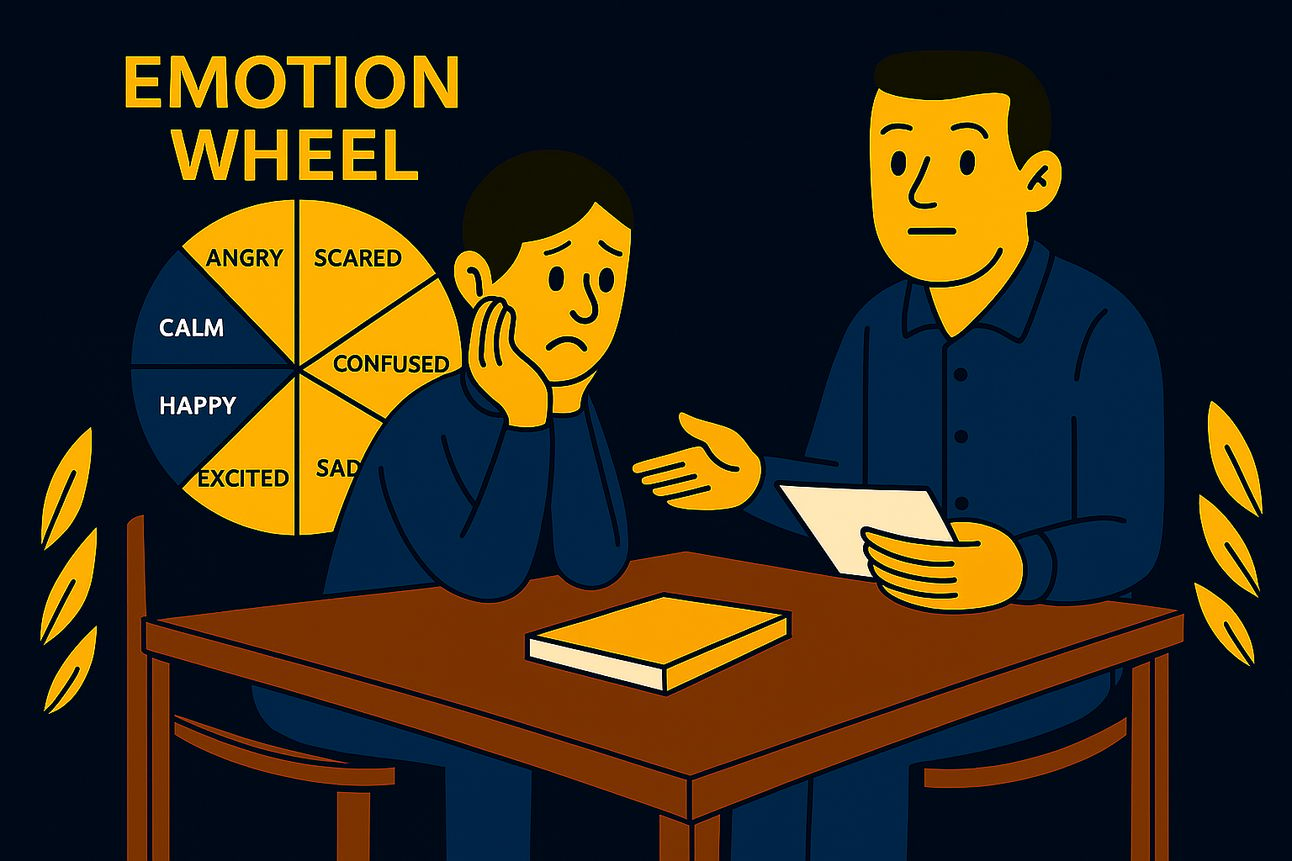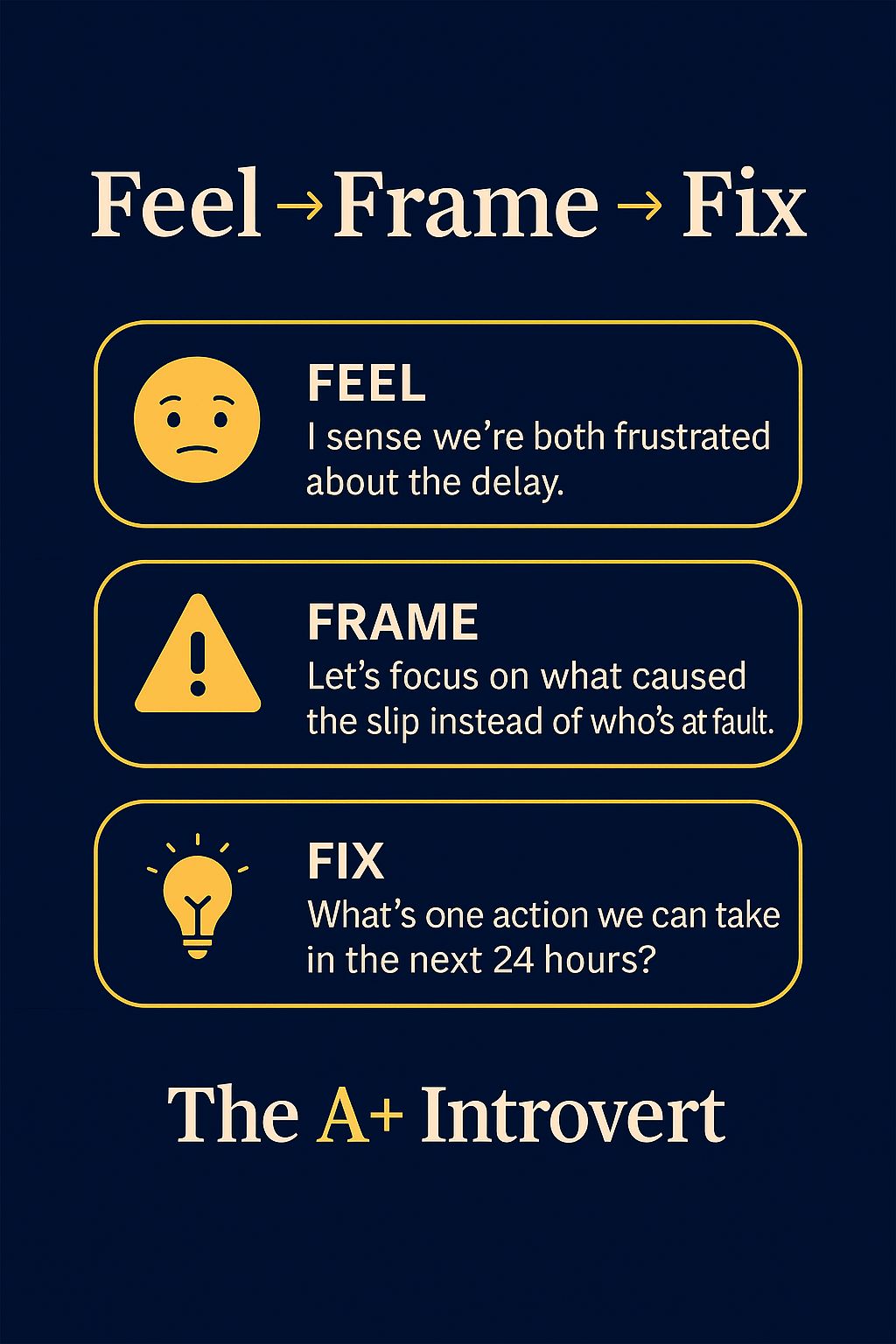- Steven Claes – The A+ Introvert
- Posts
- Steven Claes – The A+ Introvert - Conflict Calm: Lead Tough Talks With EQ, Not Volume
Steven Claes – The A+ Introvert - Conflict Calm: Lead Tough Talks With EQ, Not Volume
Master a three-line script that cools tension, keeps respect, and turns hard feedback into progress.

If someone forwarded this newsletter to you, subscribe here so you don't miss the next one!
Hey there friend!
Ever watch a regular meeting blow up and then play it back in your head over and over?
I have.
Two team leaders, one small budget.
Voices got loud, people got mean, a door slammed shut. I just stood there like a statue.
Walking back to my office, I felt terrible: I knew what to do, but I was too scared to do it.
That night, eating noodles from a box, I wrote down three simple lines. Short enough to remember when my heart was beating fast.
Two days later: different team, same problem. I used my lines. The fight went from 45 messy minutes to 12 good ones, and we made a plan.
The secret?
Stop trying to fix fights and start saying what's really wrong.
Want the lines that turn fights into teamwork?
Keep reading.
Today’s Focus
Calm beats loud in any clash
Feel → Frame → Fix script
EQ turns tension into teamwork


Download pictures if not visible
Why Emotional Intelligence Wins in Conflict
Reality check: Most workplace conflicts aren't about the stated problem. They're about unacknowledged emotions hijacking rational conversation.
Research tracking over 1,500 workplace interactions found that teams who name emotions and restate goals finish tasks 30% faster and produce higher-quality solutions than teams that ignore the emotional undercurrent.
Translation?
That awkward moment when you say "I can feel the tension here" actually reduces brain activity in the fear response center and increases activity in areas associated with problem-solving.
Perfect news for introverts: You already pause to read the room. So now you just need three sentences to make that pause pay off.
The magic isn't in having perfect words. It's in acknowledging what everyone already feels but nobody wants to say out loud.
The Feel → Frame → Fix that Actually Works
Step | What You Say | Why It Transforms the Room |
Feel | "I can sense we're both frustrated about this deadline" | Emotion labelling immediately reduces defensive reactions and shows you're tuned in, not tone-deaf |
Frame | "Let's focus on what caused the delay instead of who's responsible" | Reframes from blame to problem-solving shifting brain activity from fight-or-flight to collaborative thinking |
Fix | "What's one action we can both commit to in the next 24 hours?" | Creates forward momentum and transforms abstract tension into concrete progress. |
Emergency Pocket Version (when you’re too stressed to remember the full script):
Feel: "This feels tense"
Frame: "Let's solve the real problem"
Fix: "What's our next step?"
Pro tip: Practice these phrases in low-stakes situations first. The muscle memory matters when emotions run high.
Real-World Proof It Works
Scenario 1: Late project blame spiral
Before: 30-minute blame loop, relationship damage
After: 12 minutes to identify root cause and clear next steps
Scenario 2: Salary negotiation pushback
Before: Voices rising, positions hardening
After: Calm discussion, review meeting scheduled within 48 hours
The pattern: Acknowledgment → Redirection → Action beats Avoidance → Escalation → Exhaustion every time

Download pictures if not visible

Quiet Fuel of the Week
Resource | What It Is | Why You Need It |
|---|---|---|
Tool | Quick reference for naming specific feelings instead of defaulting to "frustrated" or "stressed" | |
Read | by Patterson, Grenny, McMillan & Switzler | Phrases that keep high-stakes talks safe |
Watch | TED-X | The science: Brain research showing why emotion labelling literally rewires conflict responses |

Your 5-Day Challenge
Monday: Identify one upcoming conversation that could get tense
Tuesday: Practice the three-line script with a trusted colleague
Wednesday: Use it in a low-stakes situation to build confidence
Thursday: Deploy it in your identified challenging conversation
Friday: Send me one line about your experience and yes, even failures help me improve future content
Track this: How does the energy in the room change after you acknowledge the emotion?

Download pictures if not visible
Coming Next Week
Decision Detox : Stop Overthinking and Pick the Best Move Fast
A two-step process that beats analysis paralysis and frees mental space for what matters most.
Final Thoughts
Conflict isn’t the villain, silence is.
Every team feels the heat; the great ones call it out.
Feel it.
Frame it.
Fix it.
Twenty-second leadership.
This week, name the elephant, once, clearly, calmly.
Watch the room exhale.
Watch yourself relax.
The hard talks won’t vanish, but they don’t have to blow up, either.
Stay steady. Speak true. Lead on.
— Steven
P.S. Know someone dreading a difficult conversation this week? Forward this. Sometimes the best gift in showing someone they’re not alone in the challenge.
P.P.S. Want daily insights on introvert leadership? Click here to connect with me directly.
How did you like today's newsletter? |
Reply